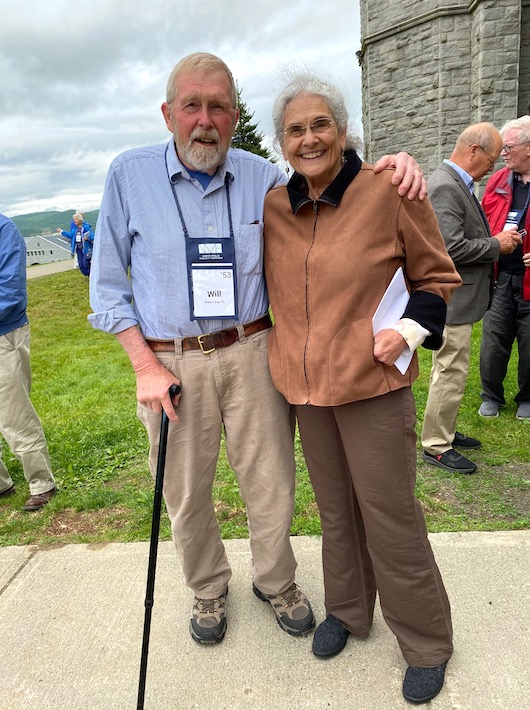A Yankee Notebook
NUMBER 2185
June 3, 2023
Building Jerusalem
EAST MONTPELIER, VT – It’s an old New England tradition, when you’ve been invited to visit someone, to adjure them not to fuss. I’ve just spent the weekend at a class reunion at my old school, and I can tell you: They fussed! It’s hard to imagine how we could have been better treated.
When I arrived here in September of 1950, I knew very little about the school, except that it’d been founded by a famous 19th-century evangelist and that the students performed ten hours a week of manual labor as part of the curriculum. These features appealed to my clergyman father and farmer’s daughter mother. I was already inured to regular worship, so the daily chapel requirement was easy. As for work, I’d never shoveled manure before, but I found the job not at all unpleasant, especially in midwinter, when I shared the warm barn with 160 happy, gently lowing ladies.
What I didn’t know yet then was that the school was an oasis of hymn-singing (remember the founder?) and sacred choral music. It had its own hymn book, full of old rousers, many of which I already knew well. At Christmastime we celebrated with a lovely candlelight vespers service, and in spring with a sacred concert that involved the entire student body, as well as alums who came back to sing with the kids.
There was another, slightly subtle, theme to our student life. Again, remembering the founder, who in the days before electronic amplification preached to thousands of people at a time, we imbibed the notion that our destiny was to try to improve the world – as one children’s hymn goes, “Brighten the corner where you are.” Obviously, not every student drank too deeply of that cup, but I’d venture to guess that of the hundreds of alumni at the reunion this weekend, most did. The ambience here is almost aggressively helpful and friendly. I frequently hear, as I head from the buffet with a tray in one hand and my cane in the other, “Can I help you with that?” or “Can I get you something to drink?” I remember especially one lovely white-haired woman who saw me to my table. I asked her if she was married. She was. Rats!
One constant staple of reunions at the school is the annual hymn sing. This year we sang the class hymns of the returning classes, those ending in -3 or -8. One year we had a request basket at the chapel entrance for people’s favorite hymns. My wife and I were appointed gatherers of the little slips of paper with the hymn numbers on them. During the singing, the chosen hymns sounded to me rather familiar. I raised a quizzical eyebrow at my wife. “Well,” she whispered, “people weren’t putting in many requests, so I put in about a dozen of my own.” She got a personal concert by a massed choir.
There are three pieces that I can never get through without tears. The first is our class (1953) hymn, “Come, Labour On.” Translated from the German by an English lady in mid-19th century – a lady whose only labor, as far as I can tell, was translation – it was our dour headmaster’s favorite. The last two words of its last stanza – “...and the glad sound comes with the setting sun, ‘Well done! Well done!’” – was his invariable farewell to each graduating senior as he shook his hand and handed him a diploma. In spite of my not having done all that well, I’ve always found the emotion implied in the sunset surcease overwhelming.
Then there’s the school hymn, “Jerusalem,” always sung with great gusto; we all know it by heart. The words are a poem by William Blake referencing the myth that Jesus visited England after his resurrection (cf. Glastonbury Thorn) and ending with a vision of England before the Industrial Revolution, and as the poet dreams it will be again. This is where the school’s mission is expressed, with Blake’s words slightly altered: “...Till we have built Jerusalem in ev’ry green and pleasant land.” That line, sung in concert with a few hundred other lusty believers in an unlikely earthly paradise, always gets me.
Music, as we know, has more than the power to soothe the savage breast. It can, for example, reach into the decayed consciousness of patients suffering dementia: Old dancers sway and singers join in with the long-forgotten words. We old folks also are easily moved to tears by ancient memories and associations. I find it frustrating not to be able sometimes to sing the words that bring back so much.
We invariably close a capella with the so-called “Northfield Benediction,” a beautiful, subdued chorus with which we commend each other to blessings, grace, and peace. This to me is the central reason for the school reunion: refreshment, communion, and corporate realignment with the mission. It’s a reminder that the work is never done, that we aren’t alone in our efforts, and that sunset is coming. That it would be a mortal calamity never to hear, “Well done!”


